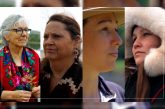
Host of Moosemeat and Marmalade, Art Napolean | Image source: Mooswa Films
The popular docuseries Moosemeat and Marmalade has returned to APTN in 2019 for another exciting season whereby co-hosts Art Napoleon and Dan Hayes explore the rise of the new Indigenous food scene. This year the duo also get experimental cooking with the likes of barbecued raccoon and bull testicals all while promoting food sustainability and teaching viewers about sacred food traditions across the many different Indigenous and non-Indigenous nations they visit. Producer and co-host Art Napoleon took time to answers questions from MUSKRAT Magazine’s Erica Commanda sharing his thoughts on the new Canadian Food Guide and the emerging Indigenous food scene.
MM: There seems to be an increasing popularity of Indigenous cuisine across the nation- what are some of your favourite Indigenous food trends you see happening?
AN: Just happy with the growing number of restaurants & food services across the country. I hope this continues to grow and hope that I can find partners to help me develop my own food product ideas. I like the way chef Rich Francis addresses legalities around serving traditional game. We need to challenge laws. We need to assert our right to be who we are and this includes our access to our real traditional foods.
MM: You get really experimental in Season 4 with “barbecued racoon” and “bull testicals.” Are there any dishes you were wary of trying that turned out surprisingly well or any disaster lessons we should be aware of?
AN: The raccoon turned out surprisingly well, and the bull testicles were ok, but after I ate them I kept charging at moving objects. Porcupine and muskrat can be tough to cook properly. Avoid disasters by taking care of your wild game. Preserve and store it properly and learn how to properly cook each cut of meat. Better yet, learn how to butcher and process your own game.

MM: As someone who is working in the Indigenous food sovereignty movement in the face of climate change, how is the conversation around food security and sustainability evolving?
AN: It’s encouraging to see youth taking a leadership role on this. There is still much corporate propaganda from climate change deniers so strategy to combat this is always needed. Food security needs to become a higher priority on the world agenda. People living comfortably do not yet relate to this important world issue. Indigenous people and allies can lead the way.
MM: You have been working with Dan Hayes for quite some time now. What important lessons have you imparted each other in your journey together working on the show?
AN: I am always learning little tricks of the chefy world as I have never worked as a head cook in a restaurant before and am not familiar with certain terms and practices like turning on a gas stove, although I’ve gotten much better. As for Dan, he likely won’t admit all that he has learned from me. Send that boy to the bush for a week without food and then we’ll see who learns from who.
MM: The new Canada Food Guide was just released that has a focus on more plant based foods. Do you think people should adopt a more plant based diet? Do you think this should include Indigenous communities who eat a protein heavy diet?
AN: In a decade or so there’ll be some new guide with a different emphasis. I take it with a grain of salt because it’s clear now that their old guides were so off base and inaccurate. Animal fats are good for you. Wild game is the healthiest of meats. Large-scale livestock production is harmful but large-scale agriculture is also harmful. If white folks or people from other cultures want to go plant based fine with me, just don’t include Indigenous communities. We love corn, berries, wild rice, beans (all Indigenous foods!), medicines and other plants but I think we will always want a bit of meat as long as it remains available. The way resources are being depleted we may have to cut back but as long it’s sustainable, I’ll be cooking, eating and serving wild game.
Check out the Indigenous Food Guide here: health.gov.nl.ca/health/findhealthservices/canada_food_guide_first_nations_inuit_metis.pdf
For episode schedule: aptn.ca/moosemeatandmarmalade
BIO:
Art Napoleon is host and co-producer of Moosemeat & Marmalade. This former chief is as comfortable on a big city stage or boardroom as he is skinning a moose in a hailstorm with a pocketknife. Art holds an MA degree from the University of Victoria, facilitates cultural awareness workshops, tours regularly as a musical performer and speaker and also serves as a juror on many arts and culture organizations across Canada.









